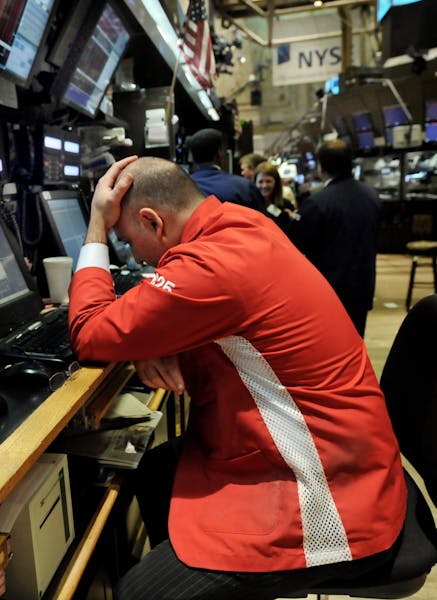Mike Slobodnik would love to buy a new car. Although he works in finance at Fury Motors in South St. Paul, even Slobodnik said now is not the right time.
"There are lot of uneasy consumers out there, and I am one of them," Slobodnik said.
Before the election, potential consumers were telling anxious car dealers that they might buy a vehicle after the election. Then they said after the first of the year. Now they're saying maybe by spring.
"It would be nice if everybody would jump in and buy so I don't have to worry as much about my employment," Slobodnik said. "But everybody is leery to pull the trigger right now on making any kind of a big purchase," he said.
Fear about the economy has stalled sales at dealerships across the country. Car inventories are piling up on dealer lots, in some cases rising to four months worth of sales, according to the National Automobile Association. Last month, General Motors' U.S. sales plummeted 45 percent, Ford's fell 30 percent, Toyota's, 23 percent. The U.S. Commerce Department recently reported that October car and parts sales plunged just over 23 percent from last year.
And Minnesota is no exception. Dealerships are trying any number of incentives to woo customers, but the pitches are getting tougher.
"There's just no traffic" on any of the lots, lamented Scott Lambert, spokesman for the Minnesota Auto Dealers Association. Minnesota lost 62 dealerships in five years to consolidation and closings.
Hecker Automotive Group, one of the largest dealership operations in the state, has been hurt by slow sales. And the company revealed in a federal lawsuit Thursday that Chrysler has frozen the financing for Hecker's rental and fleet businesses and 13 dealerships.
It's just the latest chaos felt by the auto industry, which is in the midst of asking Congress for $25 billion in bailout money.
So what's it going to take to get consumers to buy cars again?
Dealers, economists and bankers say falling gas prices and lower heating prices should loosen discretionary spending a little. And Congress is considering a bill to allow car buyers to deduct vehicle sales taxes.
But Lambert said car sales won't recover until the stock and credit markets settle down. "We have to wait for stability," he said.
Toby Madden, an economist with the Federal Reserve Bank of Minneapolis, said car buyers will start buying again when the need for the car outweighs their fears.
"When people go out and kick the car and it still won't start, or they get sick of putting duct tape on it, then they will start buying again," Madden said. But right now, he said most people are evaluating their economic situation and their job stability. "If they are at risk of losing their job, they probably want to stick with their old vehicle as much as they can."
Madden said eventually, any of three factors could jog people to risk a car purchase: increased job and income security, increased travel demands at work, or the wearing out of an existing vehicle.
Paul Taylor, chief economist for the National Automobile Dealers Association, said two primary issues hamper car sales.
"Evaporating home equity is the first ranking impediment to purchasing a new car," Taylor said. "We place credit problems as the second."
Greg Zandlo is ripe to buy a car but says he'll wait for what he expects to be "extraordinary deals" next year as the economic rout deepens in Detroit.
In the past, big sales helped clear dealership inventories. Taylor said he recently drove by a Virginia dealership selling Dodge Rams at a 40 percent discount. Those trucks sold, he said.
Ailing General Motors, which is pondering a merger with Chrysler, saw sales spike this summer when it offered "employee pricing" on cars and trucks. But when the campaign ended, sales fell off again, said Barbara Jerich, president of Hecker Automotive Group.
"The biggest issue is that the confidence of the buying public is not there. There is no amount of advertising that convinces people to come out and buy a car," Jerich said in an interview last month.
Dick Sjoquist, owner of Burnsville Toyota, begs to differ. He said commercials offering interest-free financing on new Corollas and Camrys have done the trick. "It's really helped us," Sjoquist said, adding that he's glad when Toyota extended the offer through the end of this month. "Consumers are becoming very educated aboutsmart buying," he said.
Dee DePass • 612-673-7725
BNSF Railway says it didn't know about asbestos that's killed hundreds in Montana town

Biden administration restricts oil and gas leasing in 13 million acres of Alaska's petroleum reserve
Stock market today: Wall Street stumbles toward its longest weekly losing streak since September

Thrivent has found a way for everday folks to get a piece of the private equity market

